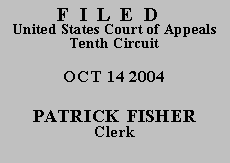

Plaintiff Darwin Rauh, a state prisoner appearing pro se, appeals the district court's disposition of his 42 U.S.C. § 1983 civil rights petition. We affirm.
In his § 1983 complaint, Rauh alleged (1) he was denied access to the administrative grievance procedure to enable exhaustion under 42 U.S.C. § 1997e(a), (2) he was denied access to his medical records, and (3) defendants were deliberately indifferent to his serious medical needs in violation of the Eighth Amendment. The magistrate judge recommended dismissal of the first claim for failure to state a claim, and the entry of summary judgment in favor of defendants on the other two claims. After conducting a de novo review, the district court accepted the recommendations.
This court reviews de novo the dismissal of the first claim and the granting of summary judgment on the other two claims. See Sutton v. Utah State Sch. for Deaf & Blind, 173 F.3d 1226, 1236 (10th Cir. 1999) (stating standard of review of dismissal by district court under Fed. R. Civ. P. 12(b)(6) is de novo); Simms v. Okla. ex rel. Dep't of Mental Health & Substance Abuse Servs., 165 F.3d 1321, 1326 (10th Cir. 1999) (stating standard of review of district court's grant of summary judgment is de novo).
In dismissing the first claim, the district court agreed with the magistrate judge that Rauh had failed to establish an actual injury entitling him to relief and in concluding that Rauh failed to state a claim for relief. Rauh's claim was not dismissed for failure to exhaust in accordance with 42 U.S.C. § 1997e(a); thus, that provision cannot form a basis for arguing defendants violated his rights under § 1983. Further, "federal regulations providing for an administrative remedy procedure do not in and of themselves create a liberty interest in access to that procedure." Flick v. Alba, 932 F.2d 728, 729 (8th Cir. 1991). "When the claim underlying the administrative grievance involves a constitutional right, the prisoner's right to petition the government for redress is the right of access to the courts, which is not compromised by the prison's refusal to entertain his grievance." Id. Rauh has made no showing that his access to the courts was compromised by defendants' actions.
The magistrate judge concluded and the district court agreed that this issue was moot because defendants provided plaintiff with his medical records. The authorization for release indicates the "entire medical file" was provided to Rauh, and Rauh acknowledged receipt of the copies by his signature on the authorization form. Although Rauh believed his medical file contained 48 pages rather than 34 pages, without any evidence to support his claim that he did not receive all of the available pages, summary judgment was properly granted on this claim.
In October 2002, Rauh was standing in the meal line when the side of his penis was hit with a coffee cup during horseplay involving other inmates. Rauh subsequently noticed a lesion, which he reported to the prison medical staff. He was diagnosed with Peyronie's disease, which involves the appearance of fibrous plaques on the penis with varying effects, including curvature. Rauh seeks a surgical procedure in the form of an inflatable penile implant.
Deliberate indifference to a prisoner's serious medical needs violates the Eighth Amendment and is a cause of action under § 1983. See Estelle v. Gamble, 429 U.S. 97, 104-05 (1976). Such a claim contains both a subjective and an objective component. See Sealock v. Colorado, 218 F.3d 1205, 1209 (10th Cir. 2000). For the objective component, this court requires that the medical need be sufficiently serious, which is a category that has been defined to include a medical need "that has been diagnosed by a physician as mandating treatment or one that is so obvious that even a lay person would easily recognize the necessity for a doctor's attention." Hunt v. Uphoff, 199 F.3d 1220, 1224 (10th Cir. 1999) (internal quotations omitted). As for the subjective component, a plaintiff "must establish that defendant(s) knew he [or she] faced a substantial risk of harm and disregarded that risk, by failing to take reasonable measures to abate it." Id. (internal quotations omitted).
Defendants' actions do not constitute indifference. Rauh was seen by the Oklahoma Department of Corrections physician, who referred him to the University of Oklahoma Medical Center (OUMC) urology clinic. Rauh was seen three times at the clinic. In February 2003, a dosage of vitamin E was prescribed. In March 2003, a topical medication was prescribed with the treating physician indicating if the medication failed, a recommendation would be made for an inflatable penile prosthesis. At a follow-up examination in August 2003, Rauh was told to continue taking the vitamin E and that penile prosthesis would be discussed with the staff. The notes of Dr. Thompson, a physician for the Oklahoma State Reformatory, indicated that an inflatable penile implant was not within the scope of medical necessity. Dr. Thompson indicated that "[i]f and when OUMC physicians are certain that surgery is necessary, a consult will be written and sent to the medical director or his designee for final approval." Thompson Affidavit at 2.
The record supports the entry of summary judgment in favor of defendants on this claim. A prisoner's difference of opinion with prison physicians regarding the type of treatment he should receive does not rise to the level of a constitutional violation. See Johnson v. Stephan, 6 F.3d 691, 692 (10th Cir. 1993). Rauh has failed to show that defendants knew he faced a substantial risk of harm and disregarded that risk. Therefore, he fails to meet the subjective prong of the deliberate indifference test.
AFFIRMED.
Entered for the Court
Mary Beck Briscoe
Circuit Judge
*.This order and judgment is not binding precedent, except under the doctrines of law of the case, res judicata, and collateral estoppel. The court generally disfavors the citation of orders and judgments; nevertheless, an order and judgment may be cited under the terms and conditions of 10th Cir. R. 36.3.